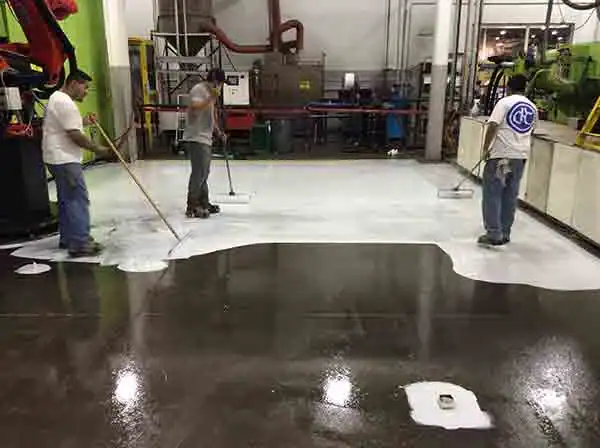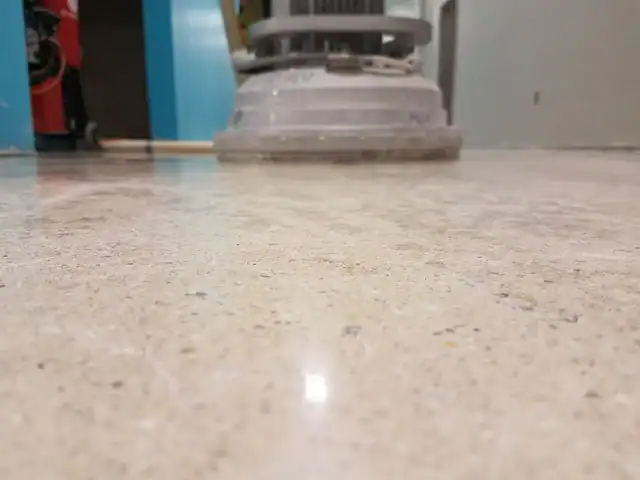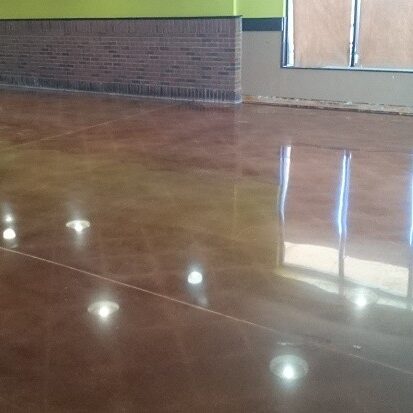
Polished Concrete Floors
Polished Performance for Industrial and Commercial Spaces
Are you looking for a cost-efficient way to upgrade the concrete floors in your retail space, patient lobby, or industrial facility? Consider having them polished to a high-gloss shine with professional concrete polishing services. The process of concrete polishing not only adds beauty to your space, but it can actually make your floors stronger and more durable.
Considering concrete polishing for your industrial or commercial floor? Here’s where to start:

What Is Concrete Polishing?
Concrete polishing is often misunderstood. It’s not just applying a surface polish or coating. Instead, this is a process similar to polishing granite or marble, where the surface itself is finely ground down with specialized equipment (using something similar to sandpaper but often involving diamond grit). The resulting shine comes from the concrete itself, not merely a shiny liquid coating.
Not only does this process give the concrete a smooth surface (which can range from a dull luster to a high shine, depending on how intensely it’s polished), but it actually compresses the concrete molecules together, so that polished concrete is at the densest, hardest state it can be in.
Below is a time-lapse video of a dry polishing job we completed for a new church lobby. Watch how the floor’s appearance changes after every stage.
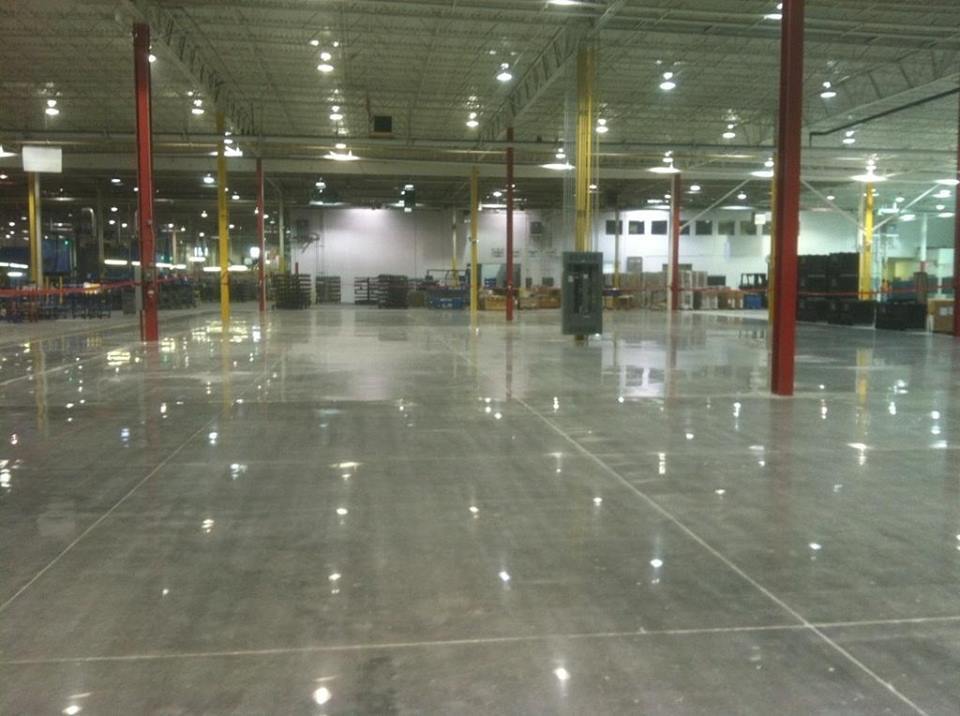


The Benefits of Polished Concrete Flooring
Because of the physical changes concrete undergoes during the polishing process, it offers significant advantages over untreated concrete floors:
Aesthetic value
Looking to make a dramatic statement? Concrete can be polished so finely that it reflects almost like glass. It can make a good impression on customers in a hospital lobby, an automotive dealership, a grocery store, or other commercial space. Its clean, attractive surface can also improve worker morale in an industrial plant or warehouse.
Durability
Because polishing increases the density of the concrete’s molecules, the hardness of your floor can be nearly doubled: polished concrete floors often reach a hardness level of 7 on the Mohs scale. This makes it more durable for wear, even if you regularly use heavy equipment.
Cost-Efficiency
Concrete floor polishing is a cost-effective flooring solution that uses your existing concrete slab, so there’s no need for additional materials or installation layers. This significantly reduces upfront costs while providing a sleek, professional finish that lasts for years.
Low Maintenance
Polished concrete floors require minimal upkeep. Their smooth, dense surface resists dusting and makes everyday cleaning (like sweeping and mopping) quick and easy. Even as the shine gradually fades in high-traffic areas, a simple, inexpensive touch-up polish can restore its luster.
Safety
Despite its smooth appearance, polished concrete often provides better traction than unpolished floors. If water is spilled on the surface, it can actually provide better grip for the shoe (though we still recommend cleaning up spills right away as a general safety practice).
Cleaner Indoor Air
You may have noticed in warehouse environments, including some home improvement stores, that there’s often a fine layer of dust on everything. That’s the nature of untreated concrete — it sheds dust over time as it ages. However, the physical changes that polished concrete undergoes eliminate the release of dust. This is not just an aesthetic advantage, but it can prevent product contamination and improve your facility’s air quality.
Eco-Friendly Choice
Polishing concrete eliminates the need for additional flooring materials, reducing waste and lowering your project’s carbon footprint. It’s a sustainable solution that turns your existing slab into a long-lasting, low-impact surface.

True Concrete Polishing VS. Budget-Friendly Alternatives
A full, professional concrete polishing job can involve up to 10 stages—each one building on the last to deliver exceptional durability, longevity, and a refined finish. But we understand that not every project needs (or can support) the full process, especially in large spaces where polished concrete can become cost-prohibitive.
That’s why we’re happy to offer more economical solutions that still deliver great results. Whether it’s a streamlined 2-step polish or an alternative finish that fits your budget, we’ll work with you to find the right approach for your space and goals.
No matter the scope, we stand behind our work, whether it’s a large-scale, high-spec polish or a cost-effective alternative designed to get the job done right without breaking the bank.
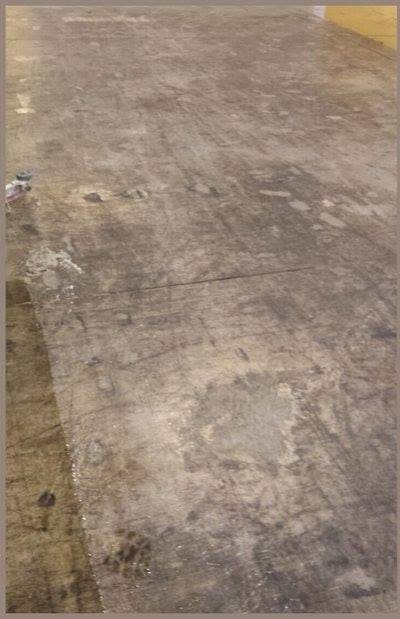
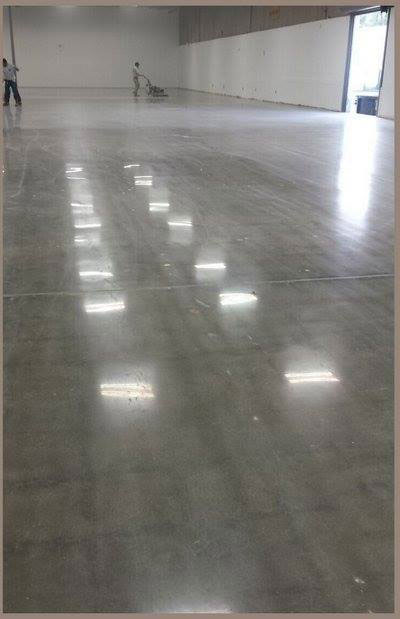

Is Concrete Polishing Right for My Industry?
Concrete polishing is often a good fit for the following applications:
- Commercial retail spaces
- Apartment complexes
- School common areas
- Grocery stores
- Warehouses
- New construction
- Customer or patient lobbies
- Churches and other community spaces
- Coffee shops and other retail areas with an “industrial” feel

Limitations of Concrete Polishing
While polishing your concrete floor is a great solution in many situations, it’s not always the right fit for every facility. Some environments that probably require a different solution include:
- Ceramic labs or other “dusty” environments: Polished concrete is not slippery when wet, but it becomes very slippery when there’s dry, loose powder everywhere. Depending on your industry, we would probably recommend a slip-resistant floor coating for such environments.
- Food processing facilities: While polished concrete is a great fit for grocery stores and other retail outlets, it’s still slightly porous despite its extra-dense surface. If you’re in the food and beverage processing industry, you need something that is absolutely “bacteria-proof”, so we recommend a USDA-approved floor coating.
- Environments dealing with chemicals: In general, polished concrete is not chemical resistant, and spilled oils or chemicals can discolor it. If you’re looking for something more stain-resistant, we’d suggest an epoxy or urethane floor coating. If you’re dealing with especially harsh substances, we recommend an extreme chemical-resistant coating.
Ready to talk to an expert?
If you’re considering upgrading your current concrete floor, our expert concrete polishing contractors at CPC Floor Coatings can help you make the decision. We provide professional concrete polishing services to a wide range of clients in the Southeast’s industrial, commercial, and healthcare industries, within a 300-mile radius of Upstate South Carolina.
We aren’t here to sell just one particular system. We’re dedicated to finding the solution that’s exactly right for you, whether that’s concrete polishing, a specialized floor coating, or something entirely different.
Whichever option you choose, you can rest assured that CPC Floor Coatings won’t take shortcuts. We have a 40-year history in the floor industry, and we are passionate about doing work the right way for the best long-term results.
Ready to learn more? Give us a call at (864) 855-0600 or fill out the form below for a free consultation.
Contact CPC for a free consultation


